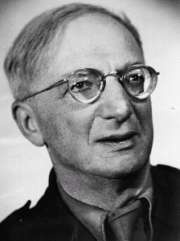|
Biografie Alfred Döblin
Alfred Döblin (n. 10 august 1878, Stettin — d. 28 iunie 1957, Emmendingen, lîngă Freiburg) a fost un scriitor german, considerat a fi unul din principalii reprezentanți ai expresionismului în literatură. Lucrarea ce i-a adus notorietate mondială este romanul Berlin Alexanderplatz (1929).
Romanul "Berlin Alexanderplatz" (povestea lui Franz Biberkopf) a fost publicat și în România, (ediția 1, Editura Romanul secolului XX, 1987; ediția a 2-a, Editura Paralela 45, Pitești, 2005), traducere și note de Ion Roman.
***
= Selected bibliography =
Die Ermordung einer Butterblume
Die drei Sprünge des Wang-Lun (The Three Leaps of Wang-Lun)
Wadzeks Kampf mit der Dampfturbine
Der schwarze Vorhang
Wallenstein
Berge, Meere und Giganten (Mountains, Seas and Giants)
Die beiden Freundinnen und ihr Giftmord
Reise in Polen (Journey To Poland)
Manas
Berlin Alexanderplatz
Die Ehe
Unser Dasein
Babylonische Wandrung (Babylonian Wandering)
Pardon wird nicht gegeben (Men Without Mercy)
Amazonas-Trilogie (Vol. 1 Das Land ohne Tod, Vol. 2 Der blaue Tiger, Vol. 3 Der neue Urwald)
November 1918 (Vol 1: Verratenes Volk, Vol. 2 Heimkehr der Fronttruppen, Vol. 3 Karl und Rosa)
Der unsterbliche Mensch
Der Oberst und der Dichter
Schicksalsreise (Destiny's Journey)
Hamlet oder Die lange Nacht nimmt ein Ende (Tales of a Long Night)
Die Zeitlupe
Aufsätze zur Literatur
In a 1967 essay, Günter Grass declared: "Without the Futurist elements of Döblin's work from Wang Lun to Berlin Alexanderplatz, my prose is inconceivable." Yet to the extent Döblin is known today at all, it is for just one work: Berlin Alexanderplatz, the subject of countless graduate papers and scholarly analyses, and also of Rainer Werner Fassbinder's spellbinding 13-hour TV adaptation of 1980. Modern, well-edited volumes of almost the complete oeuvre have been available in German since the 1980s, indicating the existence of at least some readership; and the Internationale Alfred-Döblin Kolloquien have been held every two years since the early 1980s. But only a handful of other works of fiction have ever appeared in English translations: The Three Leaps of Wang Lun (trans. C. D. Godwin, Chinese University Press, Hong Kong, 1991), and the November 1918 trilogy: A People Betrayed (which also includes The Troops Return) and Karl and Rosa (trans. John E. Woods, Fromm International, 1983 and 1987); Tales of a Long Night (trans John E Woods, From International, 1987; and the lesser-known big-city novel Men without Mercy (trans. Trevor and Phyllis Blewitt, Howard Fertig, 1976). Two works of autobiography have also been translated: Destiny's Journey (trans. Edna McCown, Paragon House, 1992), the harrowing account of Döblin's flight and exile in the 1940s; and the account of his mid-1920s Journey to Poland (trans J. Neugroschel, I. B. Tauris, 1991).
Another of Grass's observations may help to explain this neglect. Döblin, says Grass in the Akzente essay referenced above, "will discomfort you, give you bad dreams. He's hard to digest. The reader will be changed by him. If you're satisfied with yourself, beware of Döblin." But the reader who is prepared to take up the challenge can find many treasures.
The publisher's blurb for the Wang Lun epic in English, for example, calls this "the most sustained evocation, in any European language, of a China untouched by the West... Teeming cities and Tibetan wastes, political intrigue and religious yearning, life at Court and the fate of wandering outcasts are depicted in a language of enormous vigour." Döblin brought the same hallucinatory intensity of imagination and powers of depiction to another setting, South America, in the Amazonas-trilogie (1937). The continuing lack of an English translation of this epic is quite surprising, for the trilogy depicts with tremendous sweep, excitement and pathos the pre-conquest cultures of the Amazon and Andes, episodes of conquest and colonisation, and the doomed efforts of the Jesuits to save at least a fragment of the native population (a topic that may be familiar from the 1986 film The Mission).
Döblin's early association with the Futurists ended with Wang Lun. "Neither (Herwarth) Walden nor anyone else from the circle of the orthodox said a word about the novel... They developed into pure word-artists. I took another path," wrote Döblin in the Epilogue to his Autobiographische Schriften (Autobiographical Writings) in 1948. His writings from the 1920s on encompassed a tremendous range, in which he seldom repeated himself: literary theory, film and book reviews, reflections on philosophy and religion, and several epic works of fiction in the most varied styles. These include Berge Meere und Giganten (Mountains Oceans Giants, ), a dystopic science-fiction view of the far future; and Babylonische Wanderung (Babylonian Exile), a comic account of the god Marduk's adventures in 20th century Europe.
|





